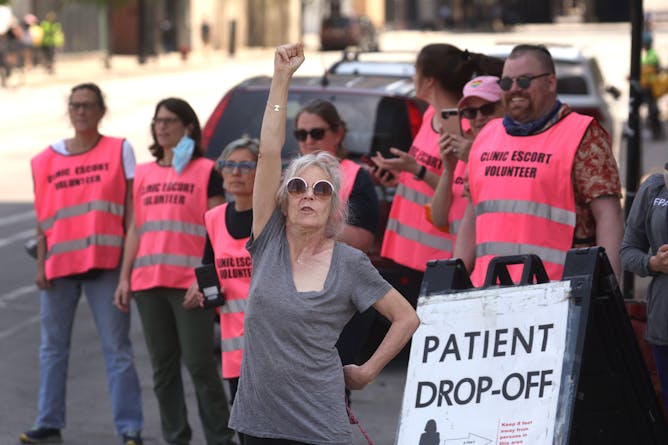|
The Supreme Court is notoriously tight-lipped about when, exactly, it will announce its decisions – including a highly-anticipated ruling which could reverse the landmark Roe v. Wade decision.
Whatever happens, the court’s ruling won’t be the final word on abortion in the U.S., points out Katherine Drabiak, an associate professor of health law and medical ethics at the University of South Florida. Rather, it could be “the starting point for states to navigate a wide range of new abortion laws,” Drabiak writes.
But deciding at the state level whether to make it easier or harder to get an abortion might be complex and time-consuming. Either way, the legal pathway ahead won’t be decided with one Supreme Court ruling.
Also today:
|

Workers at a family planning clinic watch an abortion rights march in Chicago on May 14, 2022.
Scott Olson/Getty Images
Katherine Drabiak, University of South Florida
The Supreme Court potentially overturning Roe v. Wade this spring will be only the first part of a complicated legal saga that will play out at the state level.
|
Science + Technology
|
-
Liza Vertinsky, University of Maryland; Yaniv Heled, Georgia State University
Both Macron and Madonna have expressed concerns about genetic privacy. As DNA collection and sequencing becomes increasingly commonplace, what may seem paranoid may instead be prescient.
-
Jerome Goddard, Mississippi State University
Bedbugs are pretty much universally reviled. But a public health entomologist explains how – while potentially traumatizing to deal with – they aren’t likely to make you sick.
-
Kristine Nolin, University of Richmond
Barbecued food has unique and often delicious flavors. A food chemist explains how the process of grilling over an open flame can produce flavors unattainable through other cooking methods.
|
|
Politics + Society
|
-
Jennifer Selin, Wayne State University
The public hearings of the House Jan. 6 investigative committee will deal with unprecedented events in American history, but the very investigation of these events has strong precedent.
-
Jeff South, Virginia Commonwealth University
One of the last relics of ‘lost cause’ ideology is nearing its end as a federal panel has recommended renaming US military bases now honoring Confederate generals.
|
|
Arts + Culture
|
-
Lauren M. Singer Trakhman, University of Maryland
The claims made by the creators of the app – which highlights parts of words to supposedly enhance users’ reading abilities – are dubious.
|
|
Economy + Business
|
-
Owen Wu, Indiana University; Alfonso J. Pedraza Martinez, Indiana University; Telesilla Kotsi, The Ohio State University
Cash assistance programs can be designed with incentives that encourage local retailers to keep their prices steady.
|
|
Education
|
-
Nathaniel von der Embse, University of South Florida
Waiting for kids to show signs of distress has little value, says a researcher who is pushing schools take a more proactive approach toward student mental health.
|
|